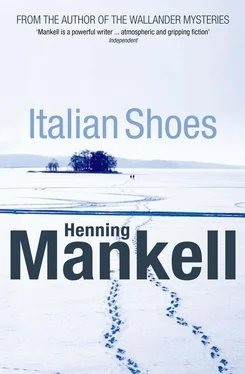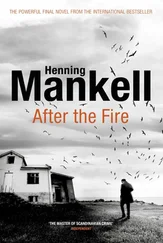‘The drought’s over for this year.’
‘But somebody might think that my house is on fire.’
‘Thank you for letting us know.’
I went outside down to the boathouse and collected the tarpaulin I’d prepared as a shroud. There wasn’t a breath of wind. It was overcast. I had soaked it in tar. I spread it out on the ground. Louise had dressed Harriet in the pretty dress she’d worn at the midsummer party. She’d combed her hair and made up her face. She was still crying, just as quietly as before. We stood for a while, embracing each other.
‘I shall miss her,’ said Louise. ‘I’ve been so angry with her for so many years. But now I realise that she has opened up a gap inside me. It will remain open, and blow sorrow over me for the rest of my life.’
I checked Harriet’s heartbeat one last time. Her skin had already started to assume the yellow colour that follows death.
We waited another hour. Then we carried her outside and rolled her up in the tarpaulin. I had already prepared the bonfire that would transform her body to ashes, and placed at the ready a drum of petrol.
We lifted her up into my old boat, and balanced it on top of the pyre. I soaked the body and the worn-out hull with petrol.
‘We’d better make ourselves scarce,’ I said. ‘The petrol will flare up. If you stand too near, you could catch fire.’
We stepped back. I looked at Louise. She wasn’t crying any more. She gave me the nod. I lit a ball of cotton waste soaked in tar, and threw it on to the boat.
The fire flared up with a roar. There was a crackling and sizzling from the tar-soaked tarpaulin. Louise took hold of my hand. So my old boat had come in useful after all. It was the vehicle in which I sent Harriet into another world, in which neither she nor I believed, but which we no doubt hoped for, deep down.
While the fire was burning away, I went to fetch an old metal saw from the boathouse. I started to cut Harriet’s walker. It soon became obvious that the saw wasn’t up to the job. I put the walker in the dinghy, together with a couple of herring-net sinkers and chains. I rowed out towards Norrudden, and heaved the walker with its chains and sinkers overboard. Nobody ever fished or anchored there. So nothing would ever hook it and reel it back to the surface.
The smoke from the fire was billowing up into the sky. I rowed back to the island, and remembered that before long Jansson would arrive. Louise was squatting down, watching the boat burn.
‘I wish I could play an instrument,’ she said. ‘Shall I tell you what kind of music Mum liked to listen to?’
‘Wasn’t her favourite music traditional jazz? We used to go to jazz concerts in the Old Town in Stockholm when we were going out together.’
‘You’re wrong. Her favourite was “Sail Along Silvery Moon”. A sentimental song from the fifties. She always wanted to hear it. I wish I could have played it for her now. As a sort of recessional hymn.’
‘I’ve no idea how it goes.’
She hummed the tune hesitantly. Maybe I’d heard it before, but not played by a jazz band.
‘I’ll have a word with Jansson,’ I said. ‘Harriet left the island yesterday. I took her to the mainland. Some relative or other came to collect her. He was taking her to hospital in Stockholm.’
‘Tell him she sent him her greetings,’ said Louise. ‘If you do that, he won’t wonder why she left.’
Jansson was on time, as usual. He had with him a surveyor who had official business to carry out on Bredholmen. We nodded in acknowledgement. Jansson stepped on to the jetty and stared up at the bonfire.
‘I phoned Lundman,’ he said. ‘I thought your house was on fire.’
‘I’m burning my old boat,’ I said. ‘I couldn’t make it seaworthy again. No point in having it lying around for another winter.’
‘You did the right thing,’ said Jansson. ‘Old boats refuse to die unless you cut them up or burn them.’
‘Harriet has left,’ I said. ‘I took her to the mainland yesterday. She sent her greetings.’
‘That was kind of her,’ said Jansson. ‘Pass on greetings from me. I liked her very much. A fine old lady. I hope she was feeling a bit better?’
‘She had to go to the hospital. I don’t think she was any better. But she sent her greetings anyway.’
Jansson was pleased to hear Harriet had thought of him. He continued on his way with the surveyor. A few drops of rain started to fall, but it soon cleared up. I went back to the fire. The stern of the boat had collapsed. It was no longer possible to distinguish between charred wood and the tarpaulin with its contents. There was no smell of burnt flesh from the fire. Louise had sat down on a stone. I suddenly thought of Sima, and wondered if my island somehow attracted death to it. Sima had cut herself here, Harriet had come here to die. My dog was dead and my cat had vanished.
I felt despondent. Was there anything about me that I could be proud of? I wasn’t an evil person. I wasn’t violent, I didn’t commit crimes. But I had let people down. My mother had been in a care home alone for nineteen years after my father died, and I only ever visited her once. So much time had passed before I got round to seeing her that she no longer knew who I was. She thought I was her brother, who had died over fifty years before. I made no attempt to convince her that I was me. I just sat there and went along with her. Yes, of course I’m your brother who died such a long time ago. Then I deserted her. I never went back. I wasn’t even present at her funeral. I left everything in the hands of the undertaker, and paid the bill when it eventually came. Apart from the vicar and the organist, the only other person present in the chapel was a representative of the undertaker’s.
I didn’t go because nobody could force me to do so. I realised now that I had despised my mother. Somehow or other, I had also despised Harriet.
Perhaps I felt nothing but contempt for everybody. Most of all, though, I despised myself. I was still a small, scared creature who had seen in his father the brutal hell that ageing could bring.
The day passed, just as slowly as the clouds drifted across the sky. When the fire began to die down, I added branches that I had first soaked in petrol. It took time to cremate a human being in the open.
Dusk fell and still the fire burned. I added more wood, raked around in the ashes. Louise came out with a tray of food. We drank what was left of the brandy, and were soon drunk. We cried and laughed with sorrow, but also with relief at the fact that Harriet’s pain was at an end. Louise was closer to me now. We sat there in the grass, leaning against each other, watching the smoke from the funeral pyre drifting up into the darkness.
‘I’m going to stay on this island for ever,’ said Louise.
‘Well, stay until tomorrow at least,’ I said.
Only when dawn broke did I allow the fire to die down.
Louise had curled up on the grass and gone to sleep. I spread my jacket over her. She woke up when I poured buckets of seawater over the embers. There was nothing left now of Harriet or the old boat. Louise scrutinised the ashes I raked out.
‘Nothing,’ she said. ‘Not long ago she was a living person. Now there is nothing left of her.’
‘I thought maybe we could take the rowing boat and scatter the ashes over the water.’
‘No,’ she said. ‘I can’t do that. I want her ashes at least to be preserved.’
‘I don’t have an urn.’
‘A jar, a tin can, anything. I want her ashes to remain here. We can bury them next to the dog.’
Louise headed for the boathouse. I felt uneasy about creating a graveyard under the apple tree. I could hear rattling noises coming from the boathouse. Louise appeared, carrying a tin that had once contained grease for the engine of my grandfather’s old boat. I had cleaned it up and used it for nails and screws. Now it was empty. She blew out the dust, put it down next to the pile of ashes and started filling it, using her hands. I went to the boathouse and fetched a spade. Then I dug a hole next to the dog. We placed the tin at the bottom of it, and filled it in. Louise went off among the rocks, and after a while returned with a large stone on which sediment had created something that looked like a cross. She placed it on top of the hole.
Читать дальше












